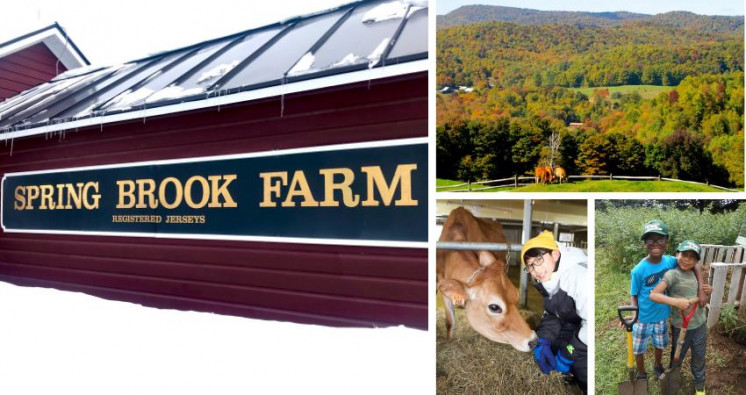
Spring Brook Farm is located in Reading, Vermont on 1,000 acres. The beautiful property is both an educational and working farm. It's home to a sugaring operation, Spring Brook Farm Cheese, and the Farms for City Kids program. Students stay for a week and participate in team-structured tasks daily between the dairy barn‚ small animal barn‚ greenhouse‚ garden, cheese house, and dormitory.
In early February 2021, DigInVT staff visited Spring Brook Farm to learn more about their dairy and programs. Meet Sarah Lewis and Ashley Maxham, who care for the 110 Jerseys!
Tell us a bit about your job, what your days are like, and what you do on the farm:
Sarah has been the herd manager at Spring Brook Farm for 5 years where she is responsible for the milking herd. She manages the breeding for the herd, general health and care of the cows, daily chores, and night checks in the barn. Sarah alternates 3:30am or pm milking and weekend chores. The milking herd consists of 42 cows and Spring Brook Farm is a “closed herd,” meaning no animals are bought in, every animal is born on the farm!
Ashley manages the health and care for calves and heifers up until they have their first calf. She started working at SBF in 2015, having worked at other dairies for 10 years prior. She does the alternate 3:30am or pm milkings during the week, 7:00am calf chores, and other general farm/herd chores.
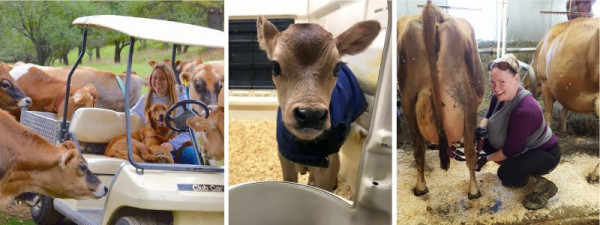
What led you to dairy? What did you do before?
Sarah attended the University of New Hampshire where she majored in pre-veterinary medicine and minored in dairy management. After college, she worked for a dairy reproduction company, traveling all over New England, breeding at large dairy farms. She fell in love with the Jersey breed and all aspects of farming.
Ashley grew up with a love for animals and was introduced to dairy at 15. She loves the Jersey breed. After graduating from the University of Vermont with an environmental science and forestry major she decided her pursuit of a veterinary career wasn't for her anymore. "I fell for Jerseys and dairy farming, so that’s where I directed my passion and love for animals."
What are your favorite parts about your job?
Sarah loves working on a farm where she is able to teach others about her passion and looks forward to working with the urban youth every day and watching them grow throughout the week. She also enjoys working with a 'smaller' herd where she is able to connect with the animals and get to know each animal’s strength and personality.
Ashley loves watching the urban youth progress in the short time they are on the farm - from fear or intimidation to confidence in the week long stay is amazing. The perspective the urban youth bring is grounding for Ashley. She also loves that she gets to share her passion with her own young boys, who are often "helping" with chores before daycare and on weekends.
Why Jerseys? Tell us more about the cows.
The farm crew makes all of their own hay so that when the cows aren’t on pasture, they eat dry hay and grain. The herd rotates through 10 fields in the pasture season and spends time in the “cow yard” in the winter for some fresh air. The cheese house loves the Jersey milk because it is high in butterfat content. They make raw milk cheese.
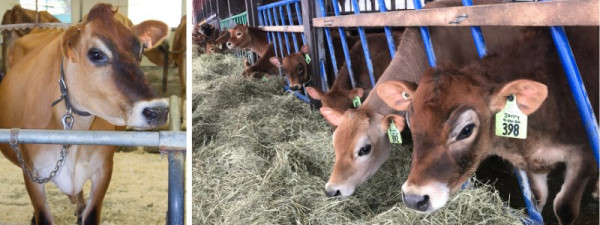
Tell us about the cheese!
All of their milk is used to produce award-winning artisanal cheeses. Specifically, the milk from Spring Brook is used for the Tarentaise, a Vermont Alpine cheese. The cheese business also has a partnership with two other local, small dairies: Jericho Hill in Hartford (30 cows) and Fox Valley in Pomfret (60 cows). “Make” days (the days they make batches of cheese) happen four days a week and the other two cheese varieties are Reading, a Vermont Raclette-style cheese and Ashbrook, their Vermont Artisan cheese.
Do you interact with and lead students in barn chores?
Yes, academics are integrated into everyday farm activities and the Farms for City Kids program is central to everything that happens on the farm. During their week on the farm, the students get to experience everything! The class of about 20 is divided into 3 groups that help with chores, from caring for the calves to being in the dairy barns and in the garden. During haying season, they help make hay and during sugaring season, they learn to tap trees and all about maple.
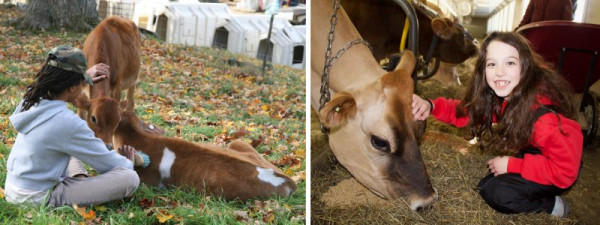
How are the cows named?
The kids love to name them! The students come up with 3-4 choices and the farm staff make the final decision. There are several name families, like islands, cars, berries, places that begin with “A,” and there is a “W” family. There are cows named Alex, Jeopardy, and Whatsit. Twins are rare, but right now they have twins named Jump and Jive. They also have a flower family, including Lily, their “go-to girl.”
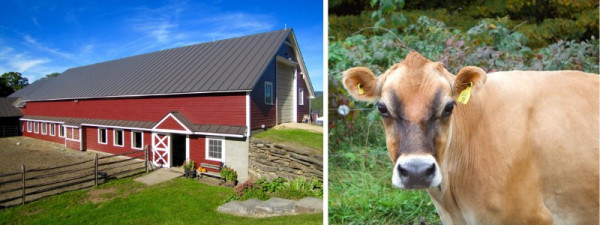
What is special about Lily?
Lily was born in 2006, making her the eldest cow in the herd. She’s had 12 calves and is the top cow. The herd is classified twice a year using a point system. The classification system takes many things into account and ranges from 50-100: 90 or higher is Excellent, 80 to 89 is Very Good, 70 to 79 is Desirable, 60 to 69 is Acceptable, and 50 to 59 is Poor (usjersey.com). Lily is a 94 point cow!
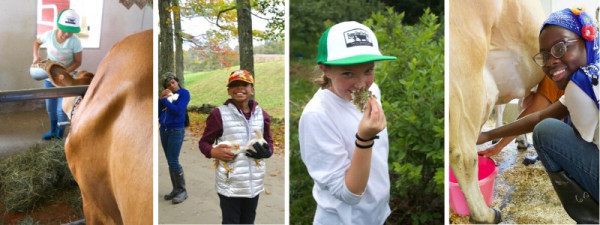
What is the history of the farm?
The farm has been a dairy since the 1950s. In 1989 the previous owners sold their cows and in 1992 the Farms for City Kids Foundation purchased the property. A new herd of cows was established from the Biltmore line of North Carolina and in 1994 a very limited children’s program began. It has grown from there, with dormitories built in 1996 and about 700 students hosted every year on the farm, from February through November. In 2010 the cheese house was constructed and the award-winning cheeses continue to grow in popularity.
Are there any future projects on the horizon?
The farm is also home to a sugar bush with more than 3,000 taps. The farm crew is growing this side of the business and adding more maple products.
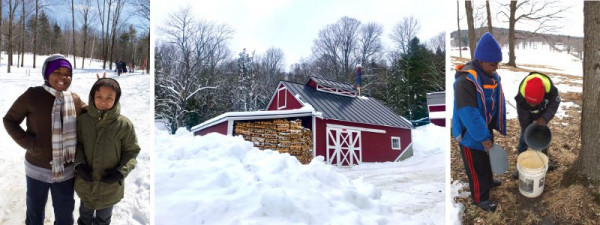
Spring Brook Farm is part of the Vermont Land Trust conservation program, and has been providing programming at no cost to the visiting schools for more than 25 years. Learn more at farmsforcitykids.org.













